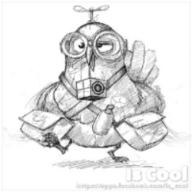因為釣不到魚而感到沮喪.
他坐在河边準備釣魚的工具,然後首先,把蚯蚓作為魚餌,掛在魚鈎上,之後把魚絲放入水中,等待魚兒上釣.
他就決定去附近的賣魚店賣一條魚,把魚放進水中,過了不久,他剛買的那條魚就上釣了.
請英文好的高手能夠幫忙翻譯這3句中文~~急
2009-09-19 9:00 am
回答 (4)
2009-09-19 1:34 pm
✔ 最佳答案
他坐在河边準備釣魚的工具, 然後首先, 把蚯蚓作為魚餌, 掛在魚鈎上, 之後把魚絲放入水中, 等待魚兒上釣.
因為釣不到魚而感到沮喪. 他就決定去附近的賣魚店賣一條魚,
把魚放進水中, 過了不久, 他剛買的那條魚就上釣了.
He sat by a riverside, preparing his fishing tools. First, he secured a worm onto the hook of his fishing rod as bait, threw out the fishing line into the water, and then waited for some fishes to get hooked.
He felt dejected because nothing happened at the other end of his pole. Then, he decided to buy a fish from a nearby fish store. He dropped the fish into the water and it was not long afterwards that he caught exactly the fish he had just bought.
http://ezinearticles.com/?Still-Waiting-For-the-Fish-to-Bite?-Check-Your-Bait!---Internet-Marketing-101-Review&id=2783599
... nothing happened at the other end of his pole
在魚桿的另一端一D動靜都無 (即是無魚上釣)
這樣表達比起直接話 "無魚上釣" 嚟得生動.
另外, 我覺得文章的第一句 "因為釣不到魚而感到沮喪"
抽調去做第二段的第一句較好, 似乎更加通順, 又接到上文下理.
希望俾你作個參考!
http://hk.dictionary.yahoo.com/search.html?q=1&s=hook&Submit=+%ACd%A6r+
釣(魚)
I have hooked a fish.
我釣到一條魚。
所以話 "等魚上釣", 我譯做 "waited for some fishes to get hooked" (passive voice).
http://books.google.com.hk/books?id=SNCF1IlWQtcC&pg=PA41&lpg=PA41&dq=drop+a+fish+into+the+water&source=bl&ots=ZL1A1ZKAEc&sig=MtChZnMrqZaTNGMQLTMb1sg5qhw&hl=zh-TW&ei=R_qzSoHjDZPU7AO50PnZCQ&sa=X&oi=book_result&ct=result&resnum=4#v=onepage&q=drop%20a%20fish%20into%20the%20water&f=false
It's often best to drop the fish into the water head-first ... (尾2段第3行)
圖片參考:http://l.yimg.com/f/i/tw/ugc/rte/smiley_1.gif
peace
2009-09-19 06:33:15 補充:
rod => pole
... secured a worm onto the hook of his fishing POLE as bait
只為了文章的用詞能夠前後一致,
先後講及魚桿都用POLE去形容會較好.
2009-09-20 2:48 am
He sits in the riverside preparation fishing tool, then first, takes the earthworm the bait, hangs in the fish 鈎 on, afterward puts in the catgut in the water, waited for that the fish takes the hook. He decided neighbor sells the fish shop to sell a fish, admits in the water the fish, crossed soon, he just bought that fish took the hook.
參考: me
2009-09-19 10:20 am
1. He felt very depressed for being unable to angle a fish.
2. He got the fishing tools ready and sat at the riverside. Then, he using earthworms as the bait, he hitched it onto the hook, threw the fishing thread into the river and waited for a fish to get angled.
3. Finally, he decided to buy a fish in the nearby fish store and put it into the water. After a while, a fish finally got angled and guess what, it is exactly the same species as the one he has bought.
2. He got the fishing tools ready and sat at the riverside. Then, he using earthworms as the bait, he hitched it onto the hook, threw the fishing thread into the river and waited for a fish to get angled.
3. Finally, he decided to buy a fish in the nearby fish store and put it into the water. After a while, a fish finally got angled and guess what, it is exactly the same species as the one he has bought.
2009-09-19 9:43 am
No fish caught frustrated him.
He sat on the river bank preparing all the fishing tools. With a piece of worm on the hook as bait, he dangled it under water waiting for his fish.
Soon, he decided to get a fish from the market nearby, and threw it into the water. It did not take him too long to successfully hook the fish he had bought.
中文版本略欠通順,翻譯成英文時故需稍作修改。
希望對你有幫助!
He sat on the river bank preparing all the fishing tools. With a piece of worm on the hook as bait, he dangled it under water waiting for his fish.
Soon, he decided to get a fish from the market nearby, and threw it into the water. It did not take him too long to successfully hook the fish he had bought.
中文版本略欠通順,翻譯成英文時故需稍作修改。
希望對你有幫助!
收錄日期: 2021-04-19 22:54:43
原文連結 [永久失效]:
https://hk.answers.yahoo.com/question/index?qid=20090919000051KK00106

